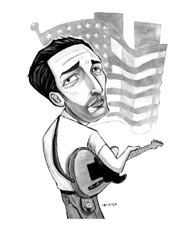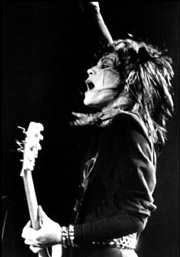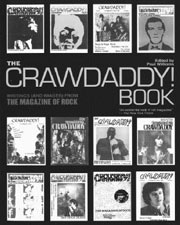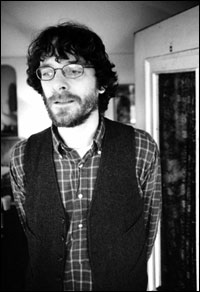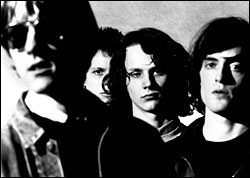The Boss, it must be said, was starting to look pretty shameless during that first week’s promotional blitz. Even if he was simply going along with his record company’s contemporary marketing notions, it was hard not to mutter “media whore” under your breath—a term generally reserved for the latest teen pop sensation, an aging superstar diva, or Michael Jackson—every time he furrowed his brow and earnestly pondered yet another question about The Rising and how his new album was influenced by the events and aftermath of Sept. 11.
Look, there he is! Bruce up at the crack of dawn on July 30, appearing on NBC’s Today, which broadcasts Springsteen & the E Street Band live from the Asbury Park Convention Center. During the day both MSNBC and CNN air their own Springsteen reports, and—whoops—there’s the guy again, chatting up Ted Koppel for ABC’s Nightline. The Koppel interview continues the following night, and by Thursday and Friday, Bruce and company are over at CBS to do a couple of tunes on The Late Show With David Letterman. See Bruce. See Dave. See Bruce pal around with Dave! What, no time that afternoon to drop in and say howdy to Oprah, too, Bruce? You can still do Regis and whatshername tomorrow morning. . . .
Meanwhile, newsstands everywhere begin sagging under the weight of Springsteen’s stubble-flecked mug. First comes the Time cover story (“Reborn in the USA: How Bruce Springsteen reached out to 9/11 survivors and turned America’s anguish into art”), followed by Rolling Stone (“The Gospel According to Bruce”)—both publications cannily selected not for their critical acumen but for their ability to reach a mass market in as short a time as possible.
It makes you wonder: Is there really that much riding on The Rising? It couldn’t have been inordinately expensive to make: a mere seven weeks spent in an Atlanta studio, with Brendan O’Brien (Pearl Jam, Neil Young) producing. Nor is it a product that you’d think wouldn’t sell itself, being the first full-length studio album for Springsteen and the E Streeters since 1984 —and particularly with memories of the triumphant 1999-2000 reunion tour still fresh in the minds of staunch Boss fans.
Springsteen’s label, Sony/Columbia, however, mindful of how fickle the millennial marketplace has become (witness recent chart flops by Mick Jagger, Paul McCartney, and David Bowie), was hedging its bets early on. Starting June 24, it began “releasing” weekly previews of The Rising, streaming key songs from the album at Springsteen’s official Web site and at AOL and Netscape kiosks; the title cut was such an Internet splash that it actually entered Billboard‘s Adult Top-40 chart at No. 22 and the Mainstream Rock Tracks chart at No. 28. The label also held high-profile listening parties for the album in numerous cities, although its refusal to provide advance review copies of the CD to but a few select publications (such as Rolling Stone, natch, whose five-star review ran in the same issue as the Springsteen cover feature) seemed mildly hypocritical despite official statements indicating that it was an anti-piracy security measure. No matter; according to SoundScan, the album wound up debuting on the Billboard Top 200 at No. 1, selling about 526,000 copies during its first week. Not exactly Eminem-hot figures, but not too shabby, either.
A lot of longtime Springsteen fans were clearly turned off by all this, judging by heated debates that played out across Boss-related Internet newsgroups. Even national pop critic Tom Moon and former Backstreets magazine publisher Charles Cross were quoted in USA Today as being a bit uncomfortable with what Moon termed “a scorched earth” publicity campaign linking Sept. 11 with The Rising.
As it turns out, there is a lot riding on The Rising for Springsteen. Only it’s just that the stakes for him aren’t so much commercial as they are artistic. Springsteen, who’s always steadfastly maintained that one of a writer’s chief goals is communication with his audience, is no dummy. He’s got kids. He instinctively grasps how a “topical/relevant” message from a 52-year-old rock ‘n’ roller can be swept over in the blink of an American Idol broadcast. At the same time, he’s also got the kind of self-aware confidence in his artistry that arrives with having spent well over half of those 52 years refining it.
As Springsteen himself, responding to a Time interviewer’s question about whether he’s comfortable with this type of media courtship for a record that deals with such intensely intimate and emotional—and for some, uncomfortable—subject matter, allowed, “You have to be very . . . just very thoughtful, is the way I’d put it. You call on your craft, and you go searching for it, and hopefully what makes people listen is that over the years you’ve been serious and honest. That’s where your creative authority comes from. That’s how people know you’re not just taking a ride.”
The Time article rightly pointed out that Springsteen’s great gift is empathy. Perhaps the corresponding trait among his audience, then, is trust—or faith. Faith in the songwriter’s ability to create lyrics and music that dig well below the surface in quest of the common ground and shared themes that reside at the core of our humanness. The ties that bind, in other words.
During the reunion tour, the E Street Band ended every concert with a new song, “Land of Hope and Dreams,” one clearly descended from Woody Guthrie’s folk populism and Curtis Mayfield’s gospel soul. Pitched like a joyous tent revival, its most celebratory line was “Faith will be rewarded.” Now, that tune didn’t make it onto The Rising. In fact, only one from among the several new songs written during the tour, “Further on up the Road,” was deemed appropriate for inclusion, while the album’s other pre-Sept. 11 composition, “My City of Ruins,” originally written about Asbury Park, inevitably earned its Rising stripes when Springsteen performed an acoustic version on the America: A Tribute to Heroes telethon, forever linking it in our minds to Sept. 11. But “Land of Hope and Dreams” was the song that sent audiences out into the night after each concert with a vivid sense of having been uplifted and having “risen up.” So it’s not hard to imagine that with The Rising, Springsteen’s urgency stems from the realization that what Americans need most right now—with the Sept. 11 anniversary looming and things looking pretty shitty in general—is also that feeling of uplift.
On several occasions during Springsteen’s media blitz, he recalled for interviewers a brief incident when, a few days after Sept. 11, he was down at the New Jersey shore and, out of the blue, a man drove up, rolled down his window, and shouted, “Bruce, we need you!”
Thinking about it afterward, Springsteen said, he understood that this wasn’t just a blurted salutation from a star-struck fan. Politicians and pundits can appeal all day long to our intellect, telling us that things are already improving, but it often seems like our culture demands that artists be the ones to deliver the message to our hearts and our souls—since Sept. 11, probably more than ever.
Obviously Springsteen’s album title and the song “The Rising” both suggest shifting meanings—the literal rising of rescue workers up smoke-filled stairwells, the metaphysical rising of spirits to heaven, etc. Still, notions of desperately desired closure and emotional renewal—elements crucial for life to move forward—drift restlessly across the entirety of the album. It’s a theme explicitly stated in the gospel tune “My City of Ruins” (the chorus goes, “Come on, rise up!”), and it’s implicit in other songs’ lines, like “Let kingdom come, I’m gonna find my way” (from the buoyant jangler “Lonesome Day) or “Darlin’, I’m countin’ on a miracle/To come through” (blues-rocker “Countin’ on a Miracle”).
And if you really think about what the guy said to Bruce down at the beach that day (remember, he didn’t say “want,” he said “need”), you’ll begin to understand why The Rising—despite this essay’s deliberate avoidance of too much musical analysis (you’ve already read plenty of reviews by now, right?), let me just say it’s a sonically challenging, musically diverse, lyrically incisive masterpiece of mood and texture—is such an important record. Accept that, and by implication you’ll also understand why Springsteen’s motivation for promoting the album so vigorously stems from anything but a shameless sense of commercial exploitation.
On the Today show, Springsteen offered a subtle but telling insight into what he needs. As a songwriter and a performer, said Springsteen, “you’re a witness. A witness to your times, your events, your neighborhood, to what you’re doing. And our band, we take the stage as a group of witnesses, really.
“Our purpose is to make you dance,” he added with a hearty laugh before turning serious again. “And to testify. And that’s the crux of what we do. Hopefully you’ll move and be lifted up.”
